|
De Litouwse dichter en schrijver Antanas Škėma werd op 29 november 1910 geboren in Lodz in Polen. Zie ook alle tags voor Antanas Škėma op dit blog en ook mijn blog van 29 november 2009 en ook mijn blog van 29 november 2010.
Uit: Steps And Stairs (Vertaald door Kęstutis Girnius)
„You thought you sailed west, west the whole day. But your boat turned around, and you return to land again. An old fisherman, a friend of your youth, sits on the rocky shore. His campfire smolders. Dead fish lie around him. In the silk sphere fish and stars, sparks and embers, veined hands and mermaid scales. In the silk sphere a round night is reflected in the electric lamp.
I think all of this when I stop two yards below the old man and see the holes in his soles, while the half-blind man feels something completely other.
He cleaned banks. In Manhattan and Brooklyn, Queens and the Bronx. In the cellar were ladders and rags, cleaning oil and soap powders, and in the marbled rooms dust stuck to furniture, walls, ceilings, lampshades, and curtains—the unctuous dust of banks, like a thick layer of frozen fat. The Ukrainian stooped often, crawled on all fours, and swayed below the ceiling; hot water flowed through his unfeeling fingers; tables and chairs, telephones and ashtrays, the steel of safes and the blue veins of marble rejuvenated themselves with damp leather, redwood mirrors, the matted shine of plastic; his hands stuck together from the cleaning oil, they smelled of pine sap, of bare feet in the morning mist, the filth of old age, and wrung-out underwear.
I.R.T., B.M.T., Independent. Every night the subways, ruled by magic hieroglyphics, carpets from "A Thousand and One Nights," flew the Ukrainian to a different part of the city. He still walked a few blocks. The same taverns with different names licked his eyes. Gondola, New Orleans, On the 7th Corner. Store windows were jammed with shirts and shoes tied with red ribbons, presents for a girl friend, children, and for oneself.“
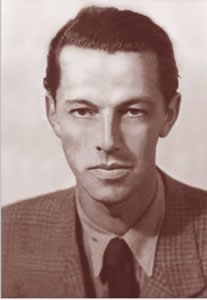
Antanas Škėma (29 november 1910 – 11 augustus 1961)
De Amerikaanse schrijfster Madeleine L'Engle werd geboren in New York op 29 november 1918. Zie ook alle tags voor Madeleine L’Engle op dit blog en ook mijn blog van 29 november 2009 en ook mijn blog van 29 november 2010.
Uit: The Joys of Love
“One Friday night in the beginning of August, Kurt, his face smeared with greasepaint and cold cream, said, “Elizabeth, I want to talk to you. Go wait for me on the old boardwalk.”
The old boardwalk was about a hundred feet closer to the ocean than the regular boardwalk. It had long ago been washed away and consisted now of perhaps a dozen barnacled piles sticking haphazardly up out of the sand.
Elizabeth climbed onto one of the piles and sat facing the ocean. She had on the full long yellow dirndl skirt and peasant blouse she had worn for ushering, and the sand had come in through her sandals and settled between her toes. The tide was coming in and small, precocious waves crept closer and closer to her. From farther down the beach came the sound of two recorders playing a duet, and the delicate notes of an old English madrigal floated up to her, so faint and so blown by the wind that the music seemed to be part of the night, one with the lapping of the small waves against the piles, the roar of the breakers muted in the quiet night, rather than a sound produced by two human beings blowing into wooden pipes. Behind her and up the boardwalk Elizabeth could still hear voices from the theatre, stragglers from the audience standing around on the boardwalk talking, members of the company coming out of the stage door and discussing plans for the evening.
Elizabeth raised her head as a voice called, “Elizabeth Jerrold, is that you?”
She tried to keep the disappointment that it wasn’t Kurt out of her voice as she called back, “Hi, Ben, where are you off to?”
Ben dropped off the boardwalk and clambered up onto the pile next to Elizabeth. “Hey, the tide’s coming in.”
“I know it is.”
He turned and tried to look at her face, which was only a pale shadow in the starlight. “Come on down the boardwalk to Lukie’s and have a hamburger with me.”
“I’m broke.”
“I’ll treat you,” Ben said, still trying to read her expression.”
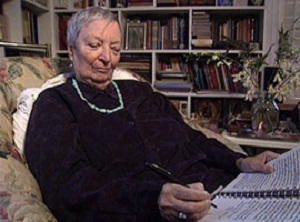
Madeleine L’Engle (29 november 1918 – 6 september 2007)
De Oostenrijkse schrijver Ludwig Anzengruber werd geboren op 29 november 1839 in Wenen. Zie ook alle tags voor Ludwig Anzengruber op dit blog.
Uit: Der gottüberlegene Jakob
„Die Frühmesse war vorüber, die Leute drängten aus der Kirche, verloren sich auf verschiedenen Wegen nach ihren Gehöften, oder verhielten sich wohl auch plaudernd, in Gruppen, auf dem großen Platze. Im Gotteshause blieben nur diejenigen zurück, die ein besonderes Anliegen auf dem Herzen hatten.
In der letzten Kirchenbank saß, in eine Ecke gedrückt, ein gar schmächtiges Bäuerlein; der große Hut, der neben ihm auf dem Sitzbrette lag, sah danach aus, als könne er sich über das ganze Männchen stülpen, daß nichts hervorsähe als die Schuhspitzen. Durch eine Rosette aus farbigen Gläsern, oberhalb eines Seitenaltares, fiel ein Lichtstreif quer in das Schiff der Kirche und machte die Weste des Beters in brennendem Rot aufleuchten; ein paar tiefe Falten durchfuhren sie, wie sie so schlotterig über seiner eingesunkenen Brust herabhing, und von den kugeligen, bleiernen Knöpfen fehlte einer; bleierne mußten's freilich sein, denn silberne auf einer »Armen-Leut'-Weste« haften nur an Spinnweben.
Jakob Wiesner hieß der Mann im Betstuhle. Er zeigte ein schmales, demütiges Gesichtchen, die Lider und Ränder der kleinen, beweglichen, grauen Augen waren gerötet und sahen wie verschwollen aus. Die Stirn war spitz, und über derselben hing ein dichter Schopf, der einer verkümmerten Locke glich: was sonst an Haaren gedieh, war vom Hinterhaupte nach vorn gebürstet, aber es waren ihrer nicht so viele, um den kahlen Wirbel verdecken zu können. Zwischen den Fingern hielt der Wiesner Jakob einen Rosenkranz, und sooft er mit einem Vaterunser zu Ende kam, wo andere Christen beten: »Führe uns nicht in Versuchung, sondern erlöse uns von dem Übel«, murmelte er regelmäßig: »Führe uns nicht in Versuchung, sondern mach mir meine kranke Kuh wieder gesund. Amen!«
Eine kranke Kuh ist eben auch ein Übel.”
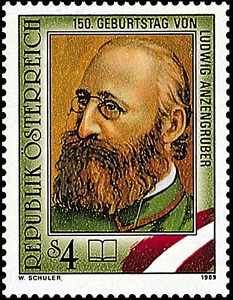
Ludwig Anzengruber (29 november 1839 – 10 december 1889)
De Cubaanse dichter en singer-songwriter Silvio Rodríguez Domínguez werd geboren in San Antonio de Los Baños op 29 november 1946. Zie ook alle tags voor Silvio Rodriguez op dit blog en ook mijn blog van 29 november 2009.
Angel for an ending
They say that when a silence
appears between two,
it was that an angel
stole their voices.
And, that day, such silence came,
the day that we had to forget.
what, in such a luck,
I still
hadn't finished quieting up.
Everything started in the surprise,
in a casual encounter,
but the night is roguish
when the luck is woven.
Without realizing it, we make an oblation
that makes a pact with the pain
or an angel passes,
it's made into a legend
and it becomes love.
Now I understand
who was the angel
who passed between us.
It was the most terrible
the rentless
the fiercest.
Now I fully understand
this mortal silence.
Angel that passes,
kisses and embraces you,
angel for an ending.
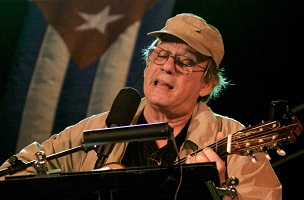
Silvio Rodríguez (San Antonio de Los Baños, 29 november 1946)
De Franse schrijver Maurice Genevoix werd geboren op 29 november 1890 in Decize (Nièvre). Zie ook alle tags voor Maurice Genevoix op dit blog en ook mijn blog van 29 november 2009.
Uit: Nuits de guerre
« Les Allemands sont tout proches. Des soldats français, mutilés, terrorisés, se replient dans le désordre. Le lieutenant Genevoix tente de rassembler ses hommes pour donner l'assaut.
Ligne de sections par quatre, sous bois, gravissant la pente. Je réagis mal contre l'inquiétude que m'inspire la nervosité des soldats. J'ai confiance en eux, en moi; mais je redoute, malgré que j'en aie, quelque chose d'impossible à prévoir, l'affolement, la panique, est-ce que je sais?
Comme nous montons lentement! Mes artères battent, ma tête s'échauffe.
Ah! ...
Violente, claquante, frénétique, la fusillade a jailli vers nous comme nous arrivions au sommet. Les hommes, d'un seul mouvement impulsif, se sont jetés à terre.
«Debout, nom d'un chien! Regnard, Lauche, tous les gradés, vous n'avez pas honte? Faites-les lever!»
Nous ne sommes pas encore au feu meurtrier. Quelques balles seulement viennent nous chercher, et coupent des branches au-dessus de nous. Je dis, très haut:
«C'est bien compris? Je veux que les gradés tiennent la main à ce que personne ne perde la ligne. Nous allons peut-être entrer au taillis, où l'on s'égare facilement. Il faut avoir l'oeil partout.»
Là-bas, dans le layon que nous suivons, deux hommes ont surgi. Ils viennent vers nous, très vite, à une allure de fuite. Et petit à petit je discerne leur face ensanglantée, que nul pansement ne cache et qu'ils vont montrer aux miens. Ils approchent; les voici; et le premier crie vers nous:
«Rangez-vous! Y en a d'autres qui viennent derrière!»
Il n'a plus de nez. A la place, un trou qui saigne, qui saigne...
Avec lui, un autre dont la mâchoire inférieure vient de sauter. Est-il possible qu'une seule balle ait fait cela? La moitié inférieure du visage n'est plus qu'un morceau de chair rouge, molle, pendante, d'où le sang mêlé à la salive coule en filet visqueux. Et ce visage a deux yeux bleus d'enfant, qui arrêtent sur moi un lourd, un intolérable regard de détresse et de stupeur muette. Cela me bouleverse, pitié aux larmes, tristesse, puis colère démesurée contre ceux qui nous font la guerre, ceux par qui tout ce sang coule, ceux qui massacrent et mutilent.
«Rangez-vous! Rangez-vous!»
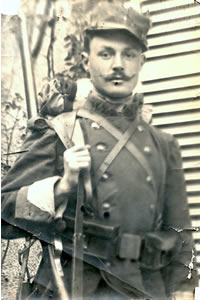
Maurice Genevoix (29 november 1890 - 8 september 1980)
Tijdens WO I
De Chileens-Venezolaanse dichter, wetgever, filosoof, politicus, diplomaat, wetenschapper, humanist en taalkundige Andrés Bello werd geboren in Caracas, Venezuela, op 29 november 1781. Zie ook alle tags voor Andrés Bello op dit blog en ook mijn blog van 29 november 2009.
Allocution to Poetry (Fragment)
Divine poetry, you who dwell in solitude'
taught to enwrap your songs
in the shady forest's silence,
you who lived in the green grotto
and had for company the mountain's echo;
it is time for you to leave effete Europe,
no lover of your native rustic charms,
and fly to where Columbus’s world
opens its great scene before your eyes.
There heaven respects the laurel,evergreen
with which you crown men's valor.
There too the flowering meadow,
the tangled wood,the twisting river,
offer a thousand colors to your brush,
And Zephyr flits among the roses,
and shining stars spangle night's chariot.
The king of heaven rises,among bright curtains
of pearly clouds;and little birds
sweetly sing songs of love in tones unlearned.
Oh, sylvan nymph,what have you to do
with pomps of gilded royal palaces?
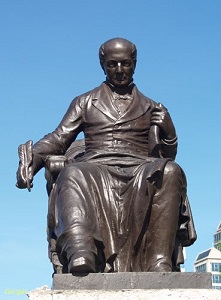
Andrés Bello (29 november 1781 - 10 oktober 1865)
Standbeeld in Caracas
|



